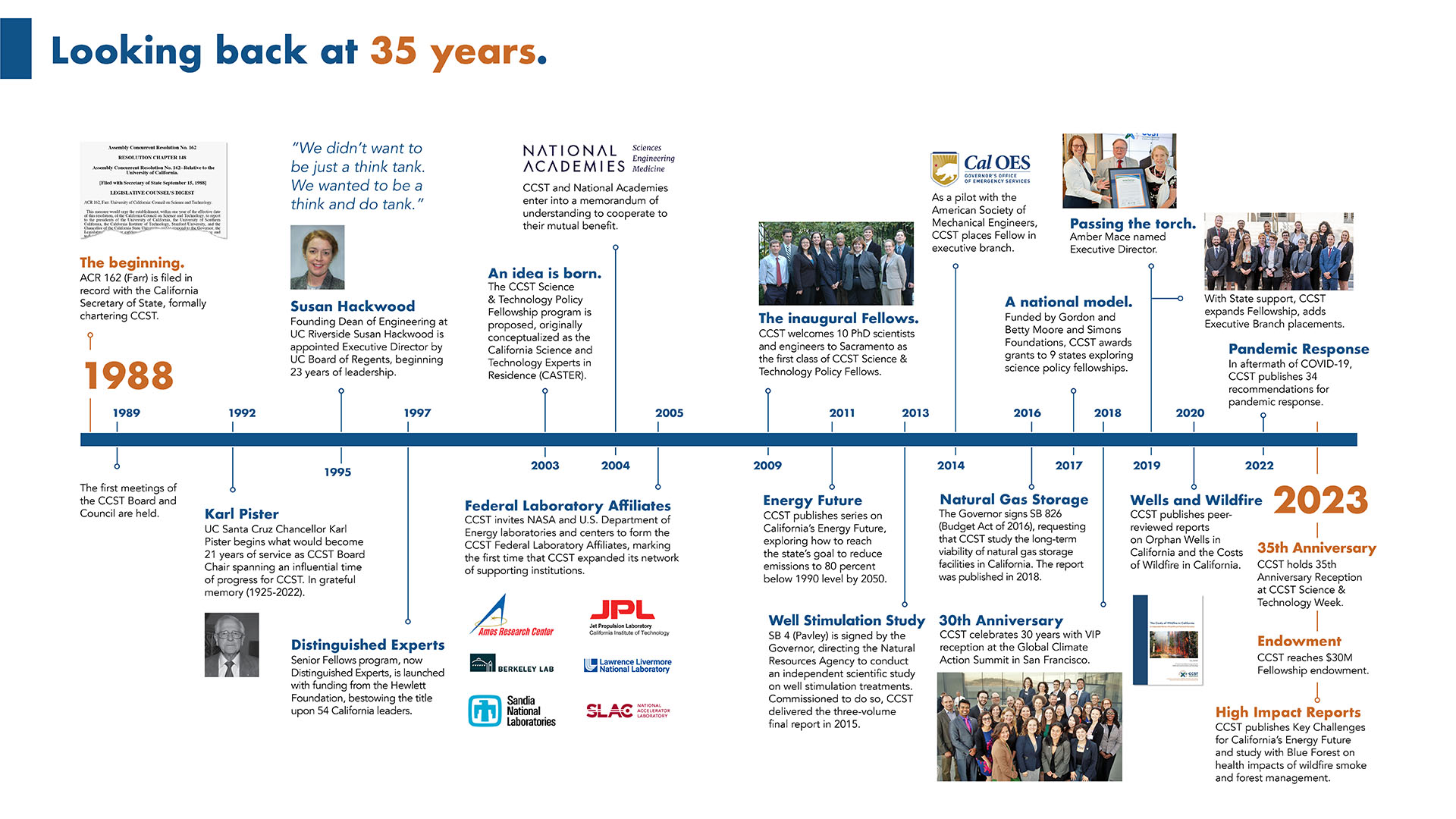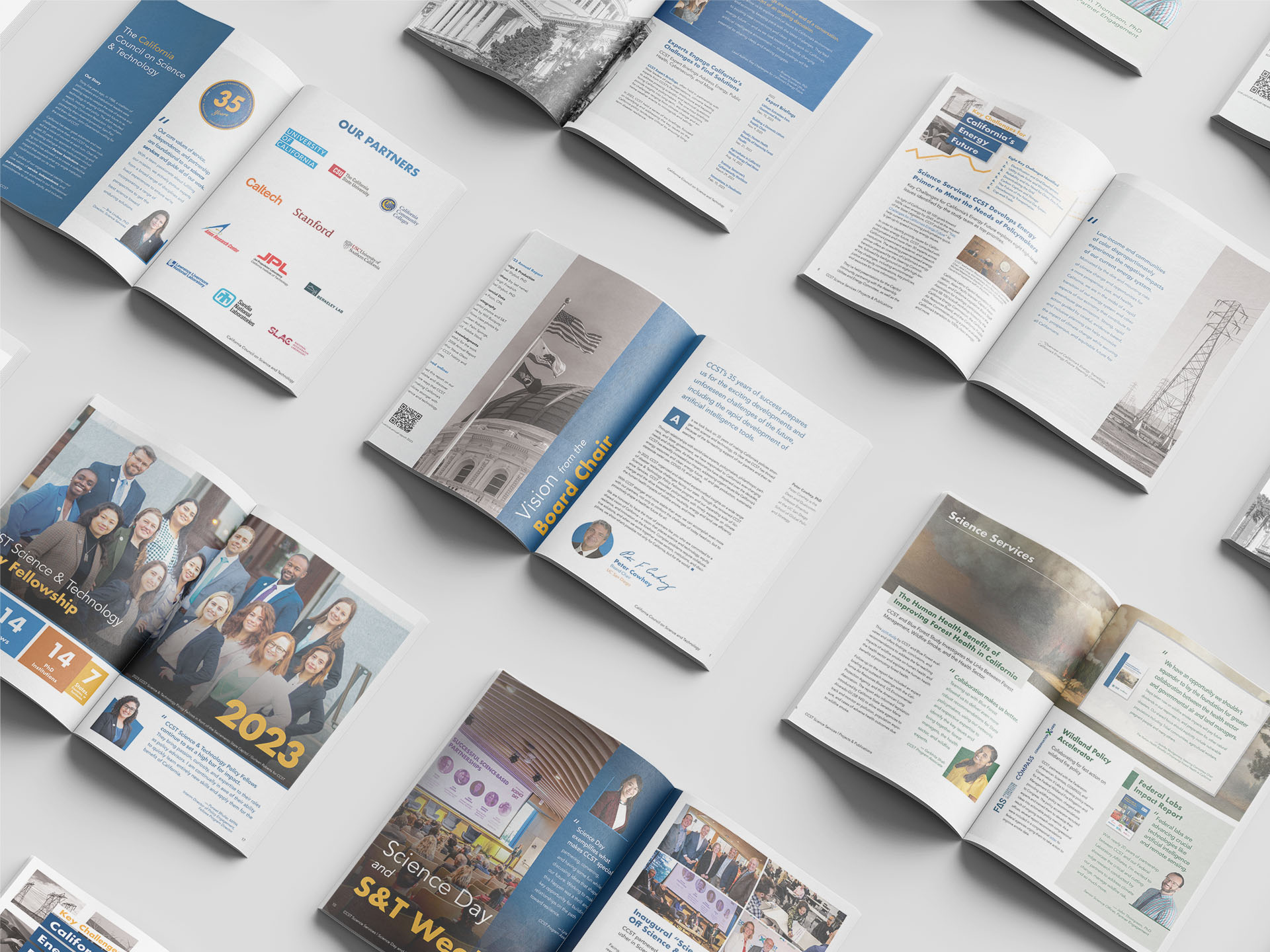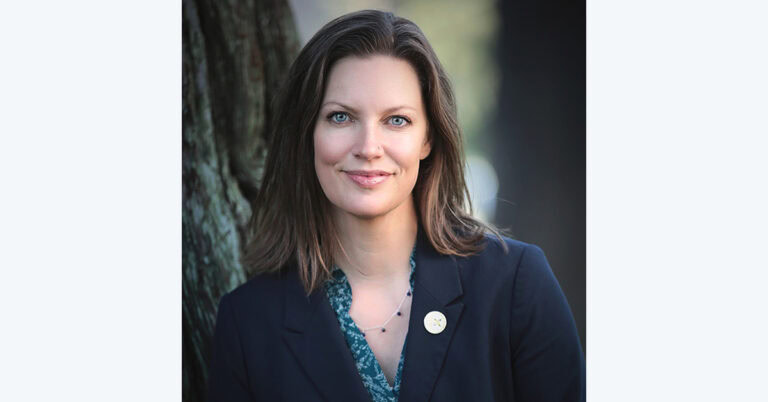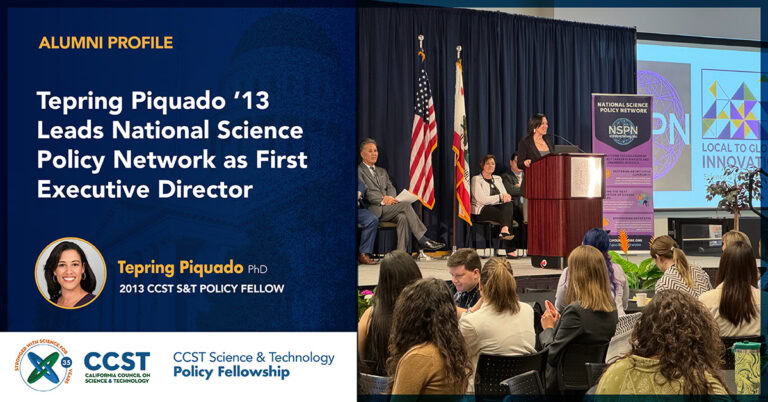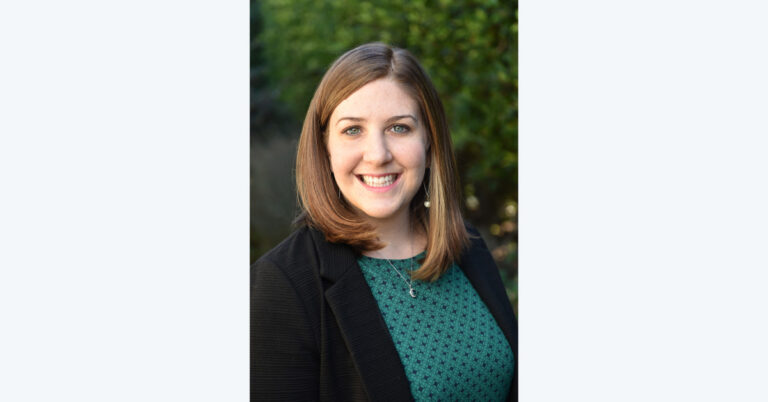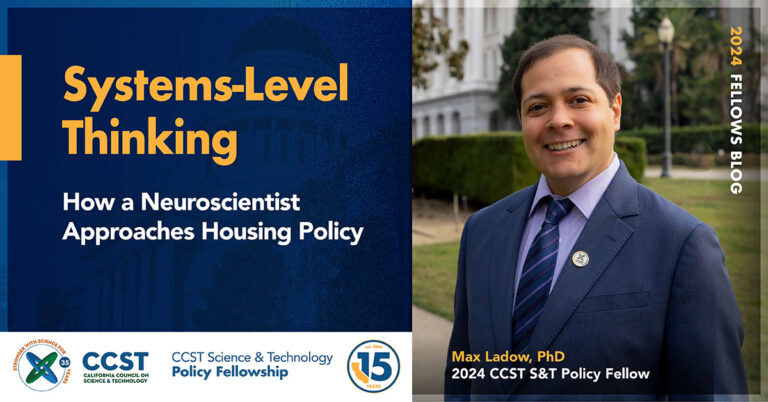CCST’s Brie Lindsey, PhD, Hired as Deputy Director at California Ocean Science Trust
CCST Annual Report 2023
May 23, 2024 | CCST Newsroom, CCST S&T Policy Fellows, CCST Science & Technology Week | Contact: Mikel Shybut
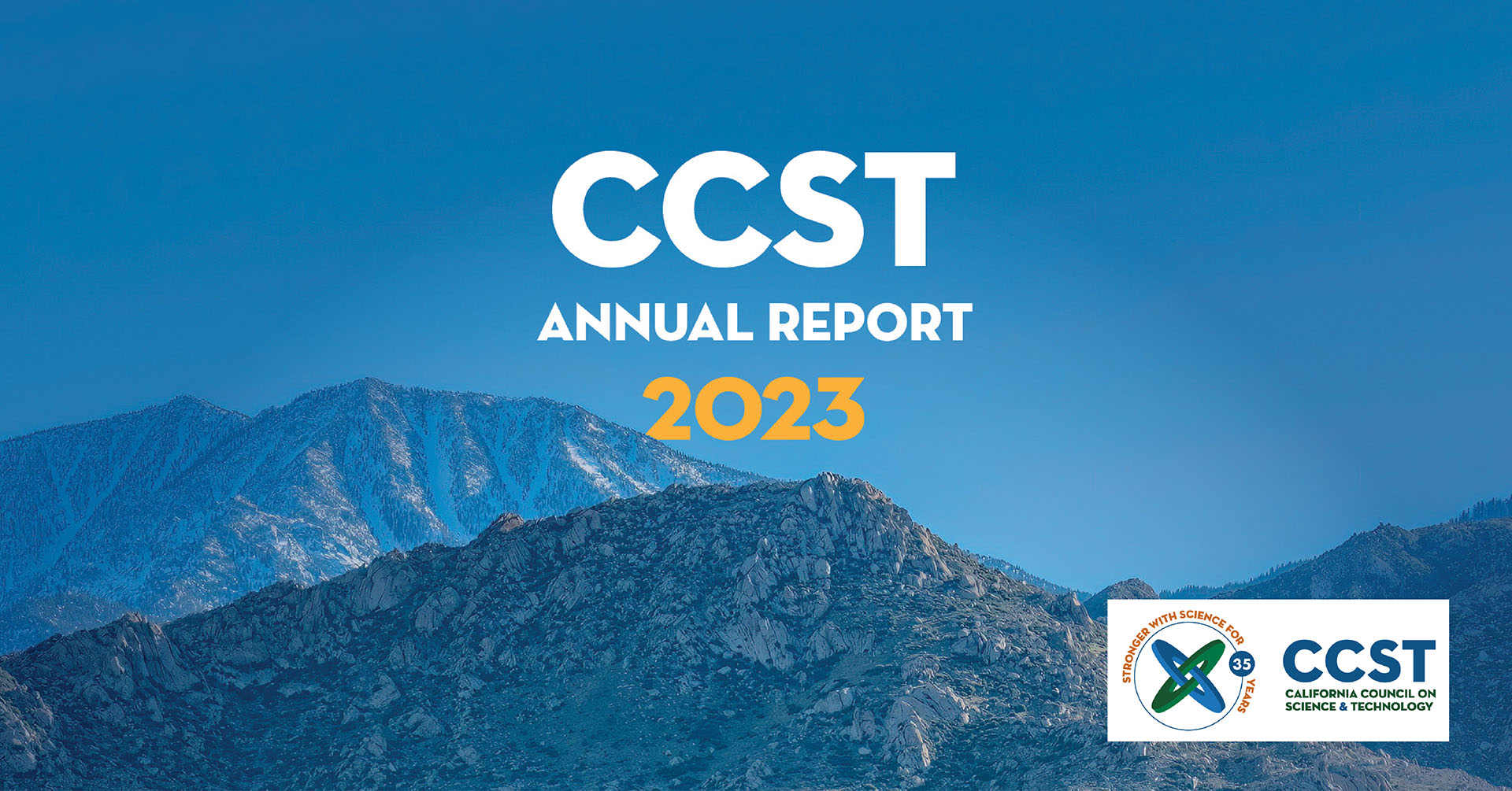
Read Online (Interactive) | Download (PDF)
Vision from the Board Chair
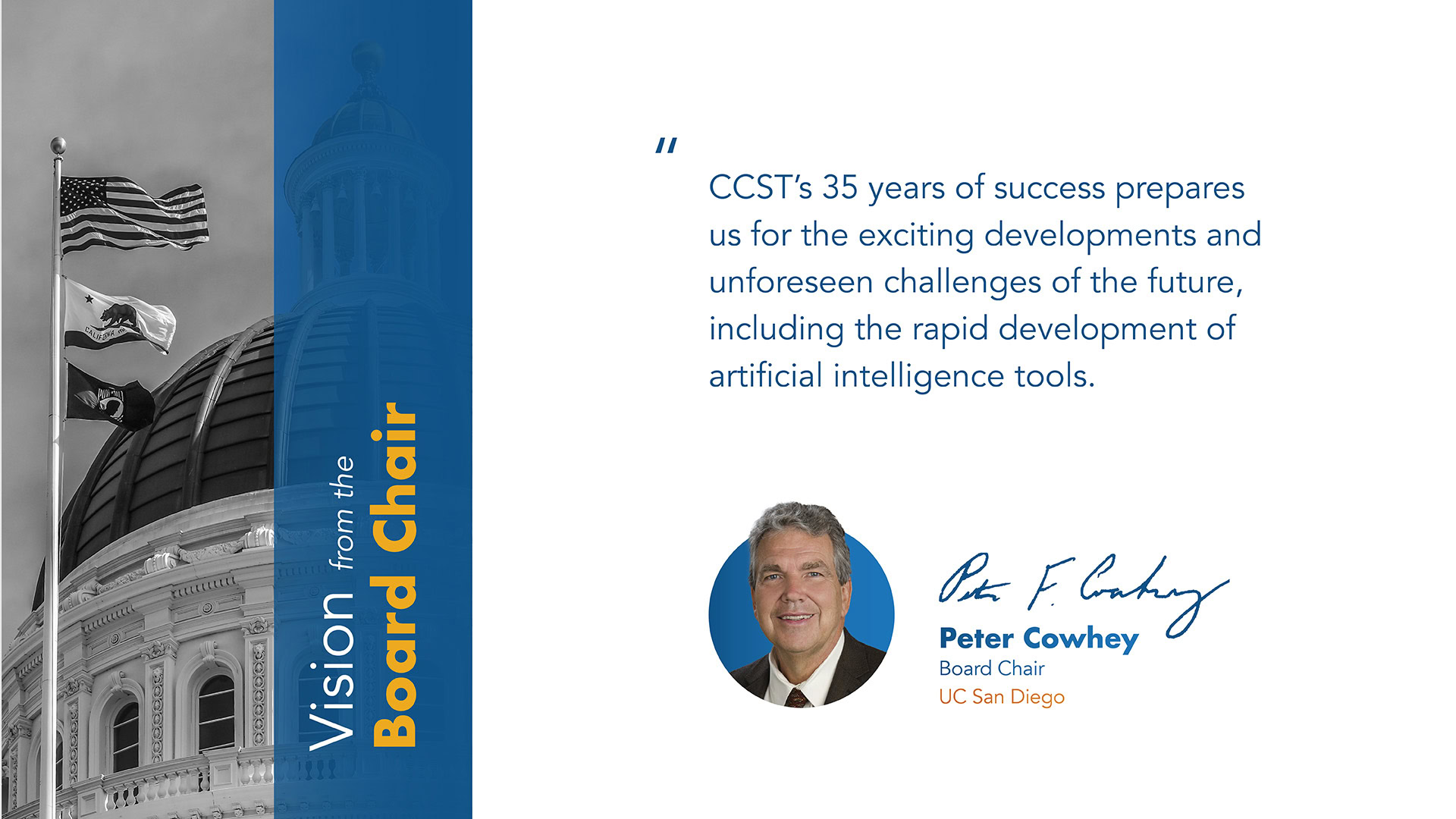
As we look back on 35 years of making California’s policies stronger with science and technology, it’s clear that CCST has thrived because of the far-reaching support of our partners and their researchers.
Through relationships with world-class experts, policymakers, philanthropic partners, and State government, we have responded to California’s ever-changing needs and challenges. As these relationships have deepened over the decades, CCST has steadily increased our impact, addressing urgent issues like California’s energy resources and clean energy future, oil and gas production, sustainable statewide water use, COVID-19, and wildfire.
In 2023, CCST organized and delivered expert-crafted insights on a wide range of disaster resilience challenges facing our state. Through the renowned CCST Science & Technology Policy Fellows program and our expanding suite of Science Services, CCST provided policymakers with timely expertise on climate change and the drive toward carbon neutrality, energy and land use efficiency, the human health impacts of wildfire smoke, and more.
With CCST stronger and more stable than ever, we can accomplish even more with our partners, not only to confront the challenges of today head-on, but to proactively shape a healthier future for all.
We are honored to have the trust of partners like you who are committed to a shared vision of California – a vision that places science and technology, equity, resilience, and innovation at the forefront. Complex problems require collaborative solutions, and when we work together across sectors, institutions, and disciplines, we show what’s possible not only for California, but for the world.
Peter Cowhey, PhD, is Chair of the CCST Board of Directors and is the Dean and Qualcomm Professor Emeritus at the UC San Diego School of Global Policy and Strategy.
A Message from the Interim CEO
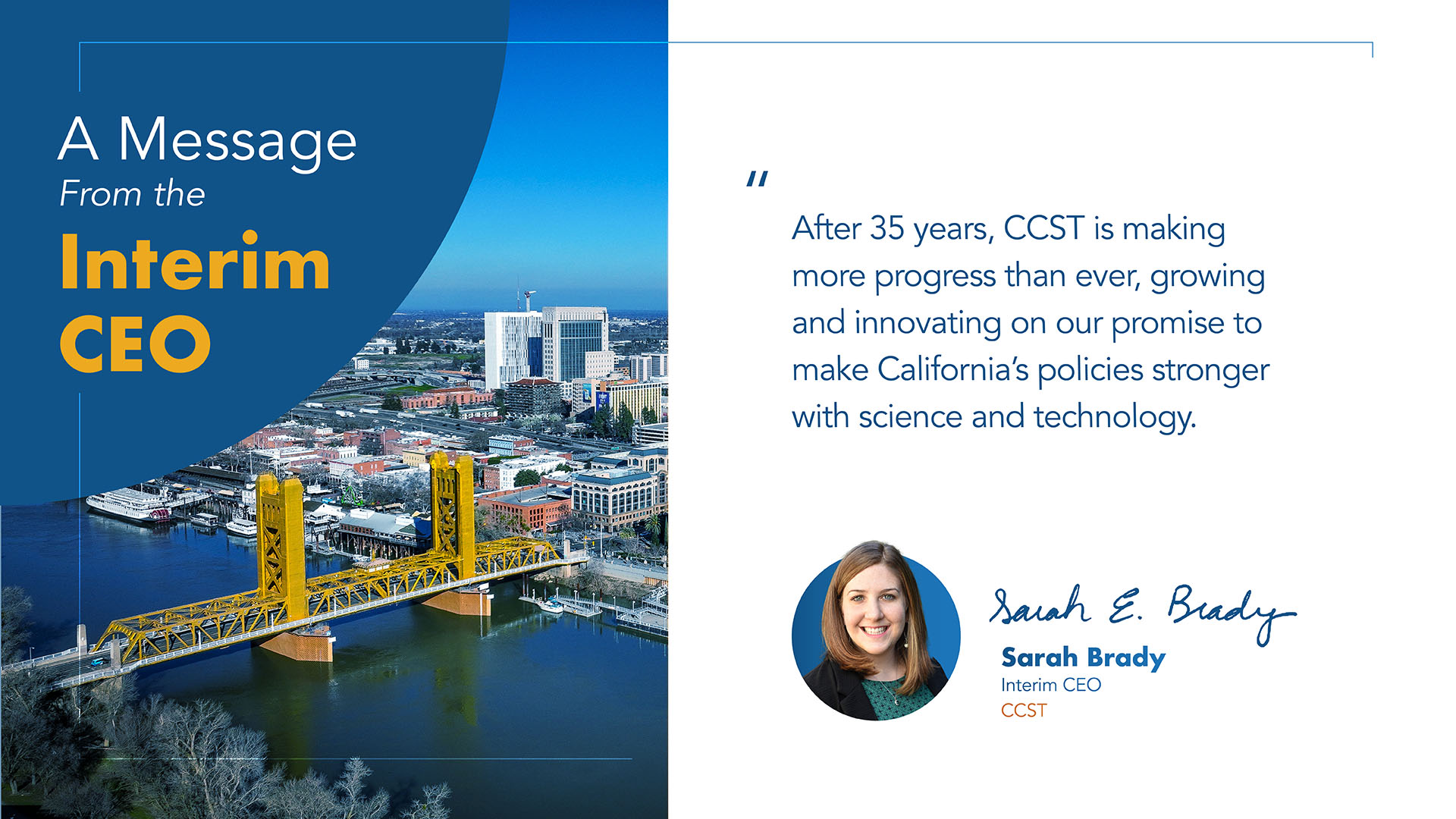
After earning my PhD in chemistry, I began my policy career as a CCST Science & Technology Policy Fellow a decade ago, before joining the CCST staff in 2016. In that time, CCST has grown and changed in remarkable ways. Through strategic planning, fundraising, and State budget asks, we secured the support necessary to grow our team and expand our Science Services. As CCST strengthened its reputation as a trusted source of independent, evidence-based advice, we expanded our network of world-class experts and deepened our relationships with California policy leaders.
In my various roles at CCST, I’ve had the privilege of launching new projects, programs, and initiatives that are still going strong today, including CCST’s annual Science & Technology Week, our Expert Briefing series, Disaster Resilience Initiative, and the expansion of the fellowship program into the Executive Branch. In 2023, after leading the long-term strategy to secure state funding for the fellowship, I saw the fulfillment of CCST’s $30 million endowment fund, ensuring that the state has access to science and technology advice in perpetuity
As we look toward the next 35 years of bridging the gap between science and policy, CCST is more committed than ever to the integrity of our work as we address crucial science, technology, and equity issues affecting California. In the process, we’ll continue advancing diversity and inclusivity across all of our work, amplifying the work of our Partner Institutions, and innovating on how to best serve the needs of policymakers.
I’m so grateful for your continued support and partnership. Thank you for being a critical part of what we do!
Sarah Brady, PhD, is Interim CEO at CCST, bringing years of experience in California State Policy, energy, and scientific research.
Our Partners
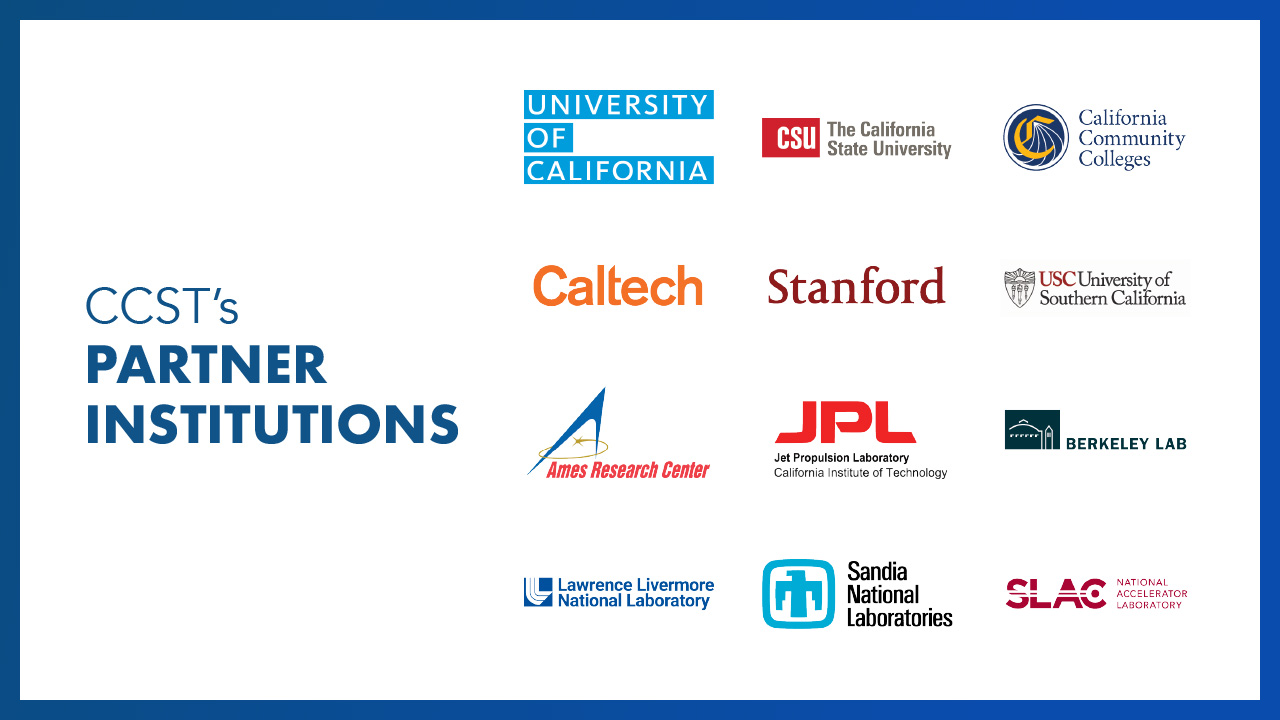
We work across institutions, partnering with academic, research, governmental, philanthropic, and other communities to leverage their collective expertise and diverse perspectives to fulfill our mission. This includes formal partnerships with California’s major post-secondary institutions and federal labs and research centers.
Our Story
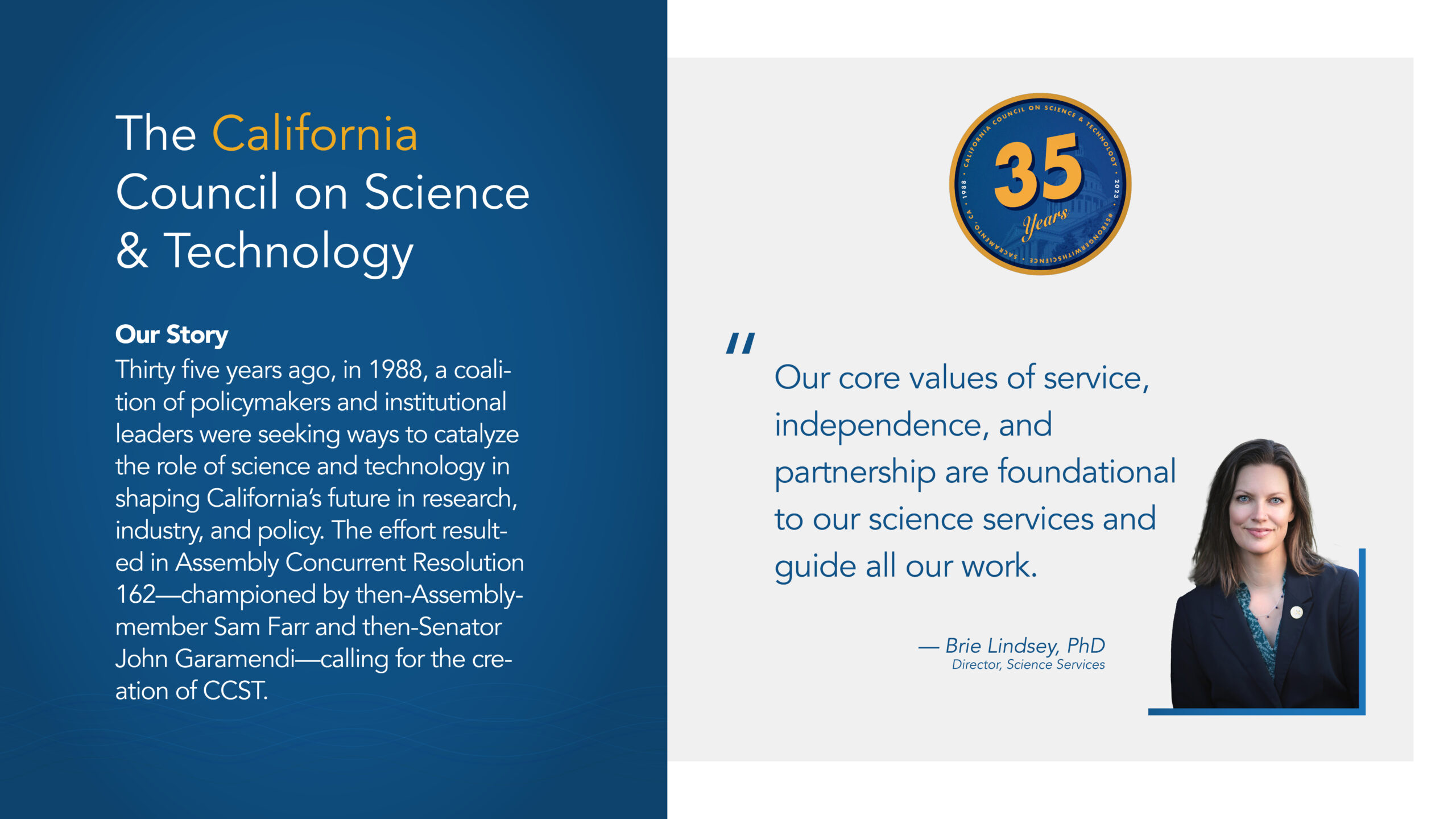
California has seen great advances and new challenges since our founding, and CCST has been invited as a voice of counsel at each turn. Over the past 35 years, our approach to partnering and facilitating dialogue across institutions—including our renowned Partner Institutions—and disciplines has allowed us to create a collective impact that exceeds what any single institution could accomplish on its own.
The pillars of our organizational identity—our core values of service, independence, and partnership—are anchored in our foundational commitments to diversity, equity, and inclusion.
“With a team passionate about fulfilling our mission, we actively pursue experts from a broad range of disciplines and lived experiences to ensure we’re incorporating a range of perspectives to get the best science toward enduring solutions,” said Director of Science Services Brie Lindsey, PhD.
Science Services
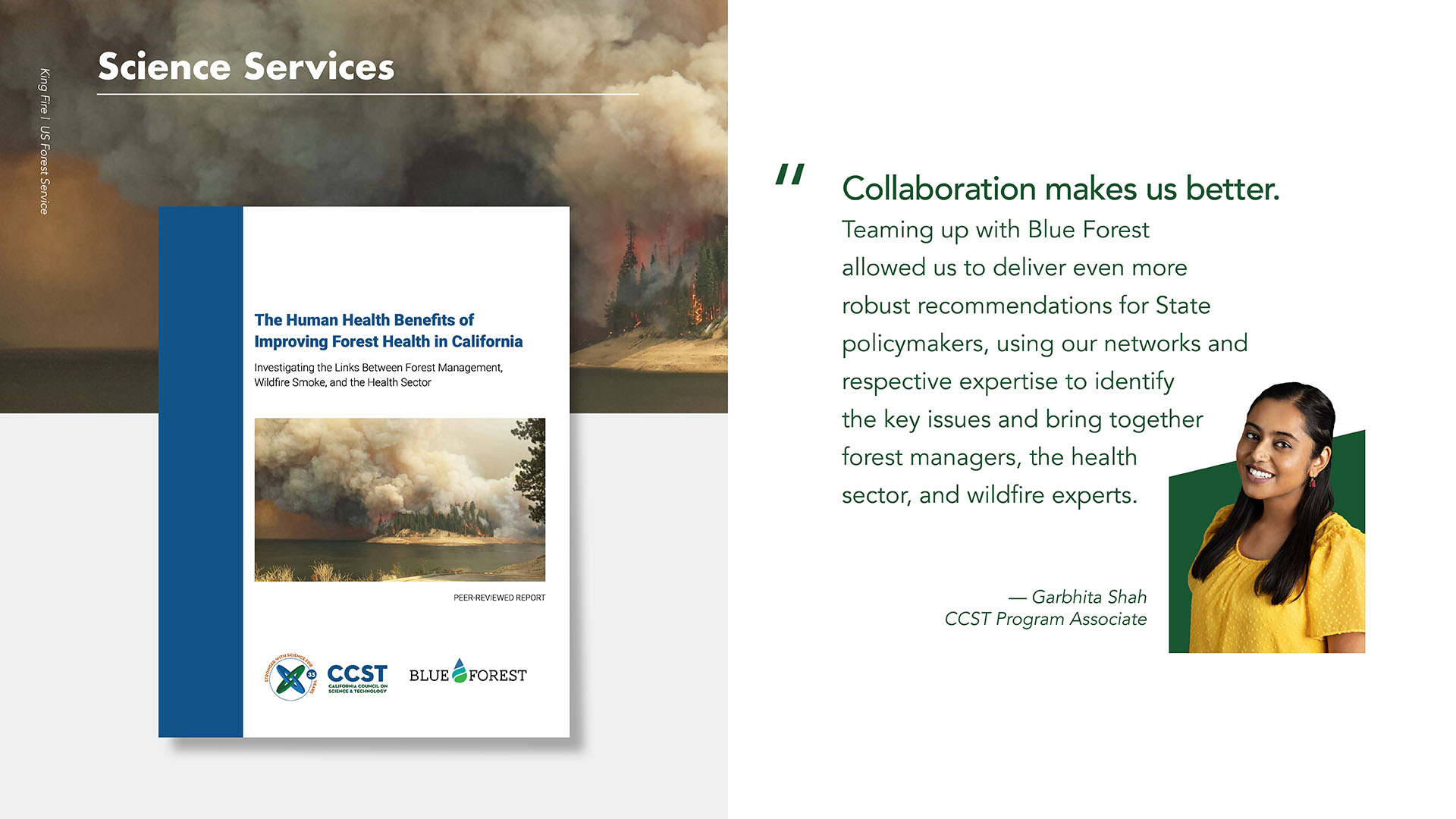
The Human Health Benefits of Improving Forest Health in California
CCST and Blue Forest Study Investigates the Links Between Forest Management, Wildfire Smoke, and the Health Sector.
This joint study by CCST and Blue Forest evaluates and offers findings, conclusions, and recommendations to address the far-reaching impacts of wildfire smoke on human health and the health sector and explores the human health benefits of promoting forest health.
Follow-up on the report has included an expert briefing and outreach meetings with the California Air Resources Board, US Environmental Protection Agency, and the American Lung Association. The report also informed legislation introduced by California State Senator Marie Alvarado-Gil (SB 945) to allow state agencies to track and monitor air pollution, population exposure, and cases of adverse health outcomes due to wildfire smoke.
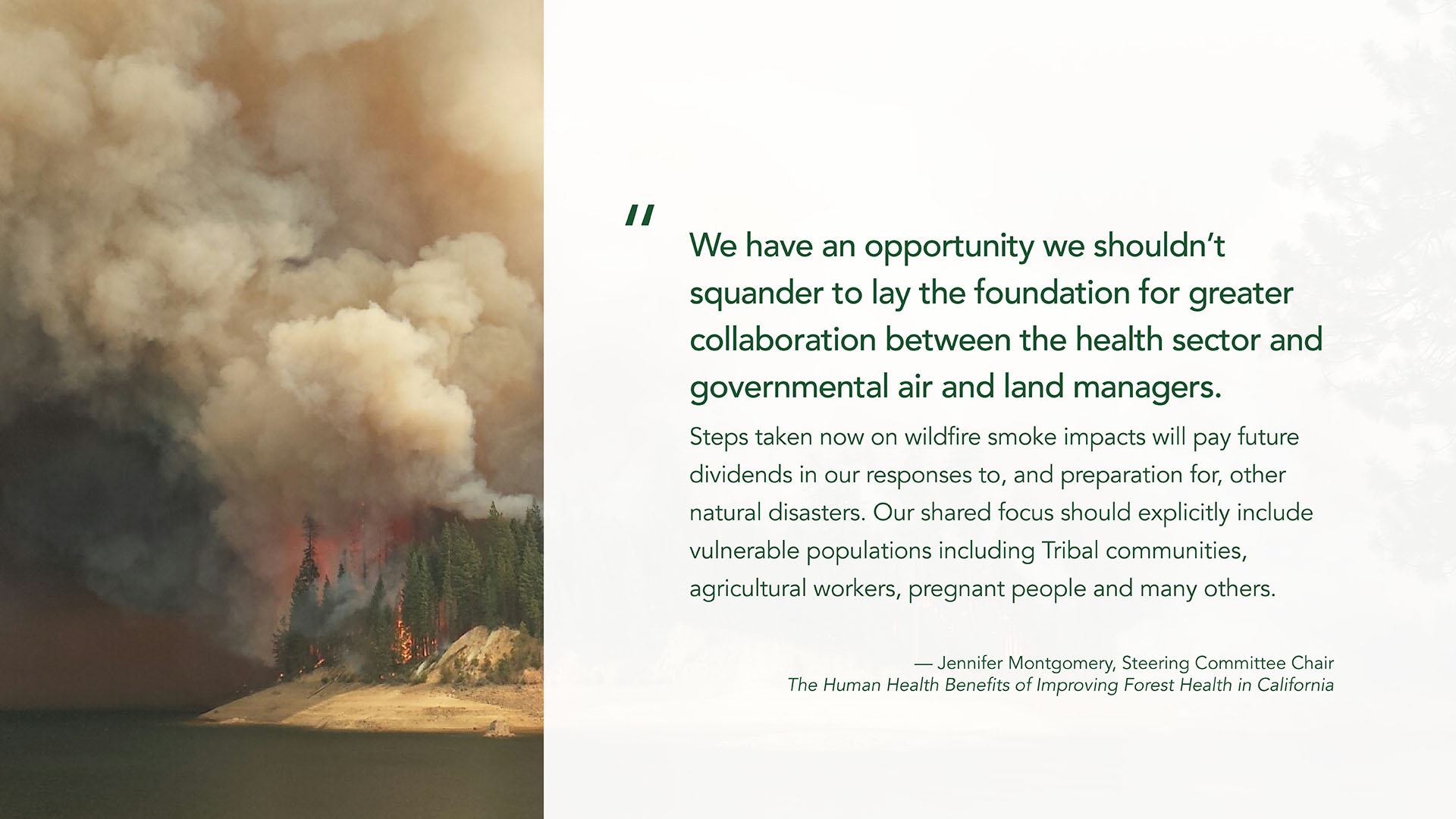
Wildland Fire Policy Accelerator
Collaborating for fast action on wildland fire policy
CCST partnered with the Federation of American Scientists, COMPASS, and Conservation X Labs to develop policy memos for the Federal Wildland Fire Mitigation and Management Commission, charged with providing wildfire policy recommendations to Congress. The policy accelerator recruited experts and trained them to develop their ideas into actionable policy memos. As a result of ongoing outreach with congressional offices, several report recommendations were included in a congressional letter to federal agencies urging them to take action to improve smoke data.
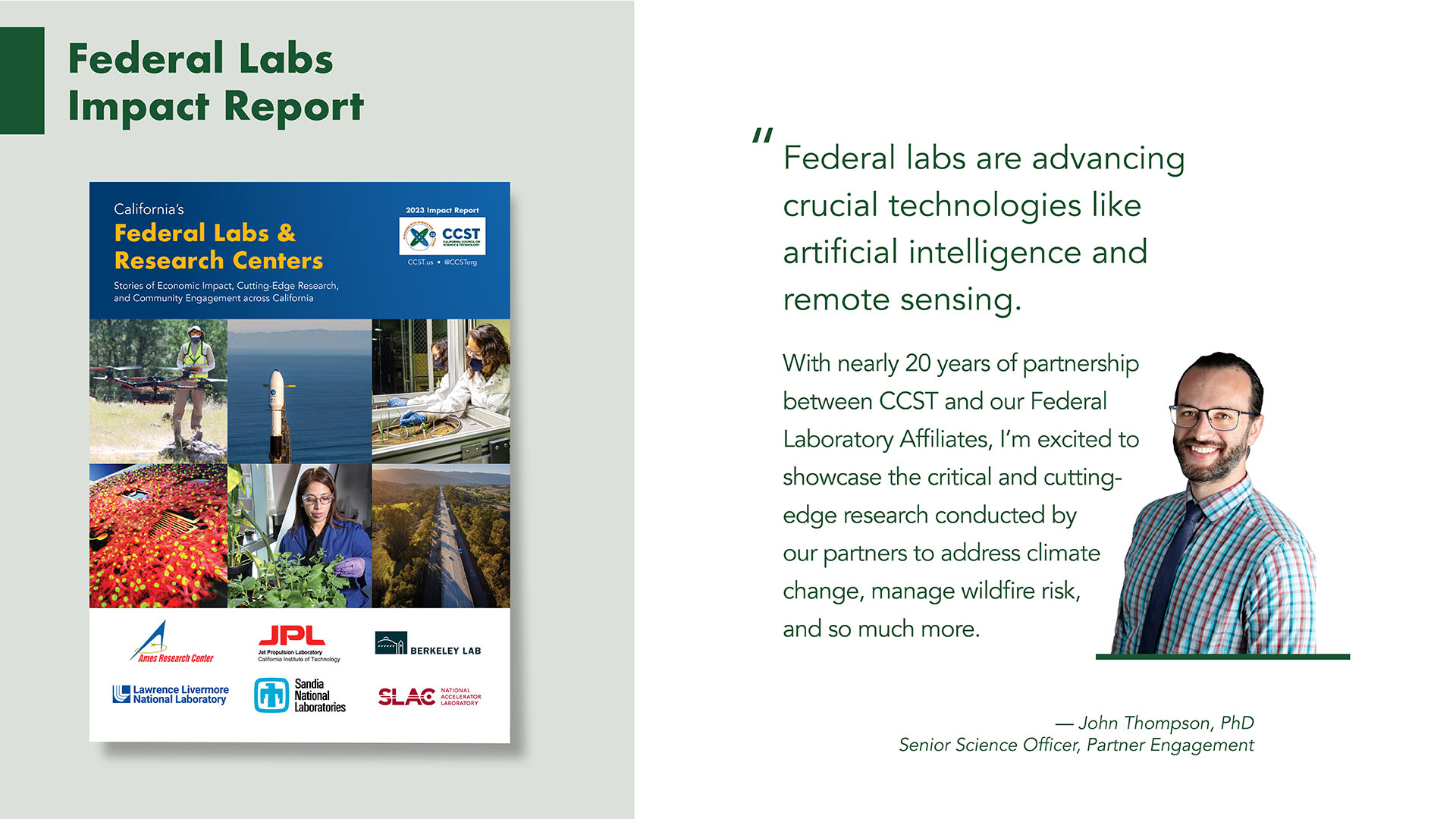
Read the 2023 Federal Labs Impact Report
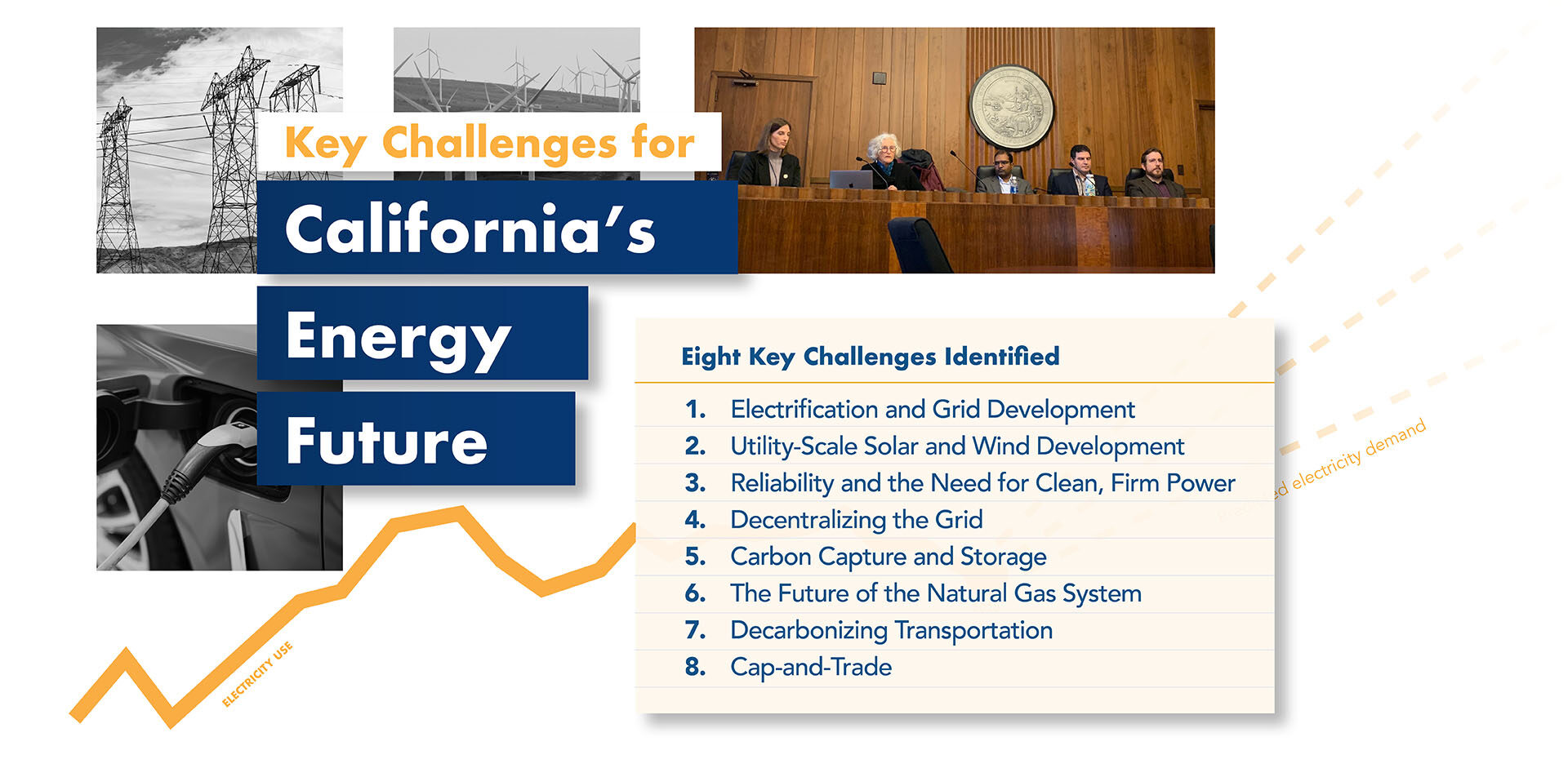
CCST Develops Energy Primer to Meet the Needs of Policymakers
Key Challenges for California’s Energy Future explores eight high-level issues identified by the study team as top priorities.
In light of California’s SB 100 goals toward 100% clean energy by 2045 and at the request of the State Legislature, CCST published “Key Challenges for California’s Energy Future” to help current and incoming policymakers quickly get up to speed on key energy issues.
In order to identify priority issues for California’s clean energy future, CCST consulted with policymakers and more than 30 experts across California’s preeminent academic and research institutions. The resulting peer-reviewed energy primer offers an overview of California’s energy transition prepared by the Steering Committee, followed by background on eight high-level key challenges, including environmental justice and equity considerations, key policies, and resources for more information.
They’ve held presentations for the Capitol community, partnering with the Assembly Utilities and Energy Committee, as well as the California Latino Capitol Association Foundation, Asian Pacific Islander Capitol Association, and California Legislative Black Staff Association for briefings; participated in the joint SB 100 kickoff workshop hosted by the California Energy Commission, the California Air Resources Board, and the California Public Utilities Commission during a panel evaluating California’s transition to 100% clean energy; and more.
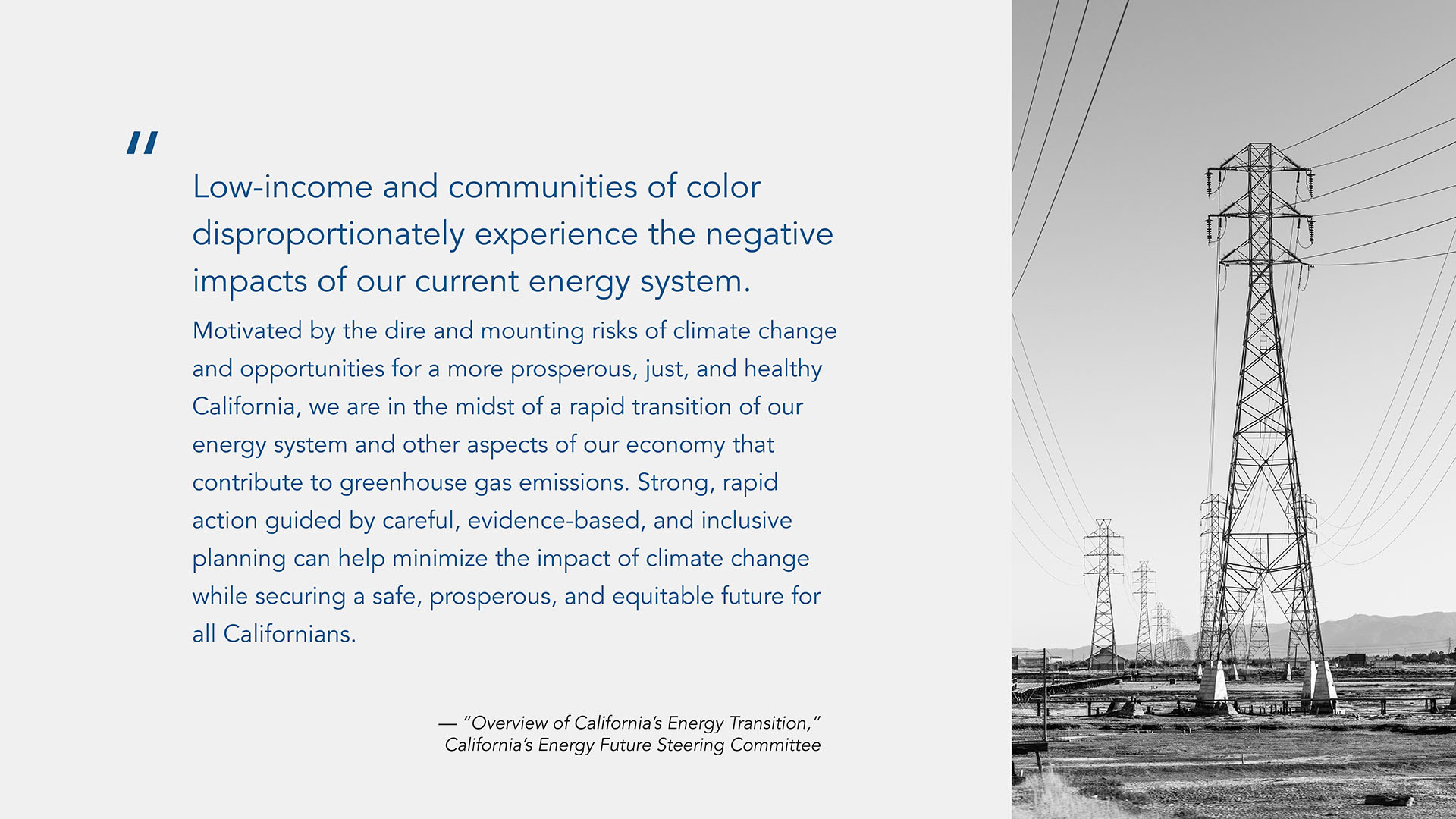
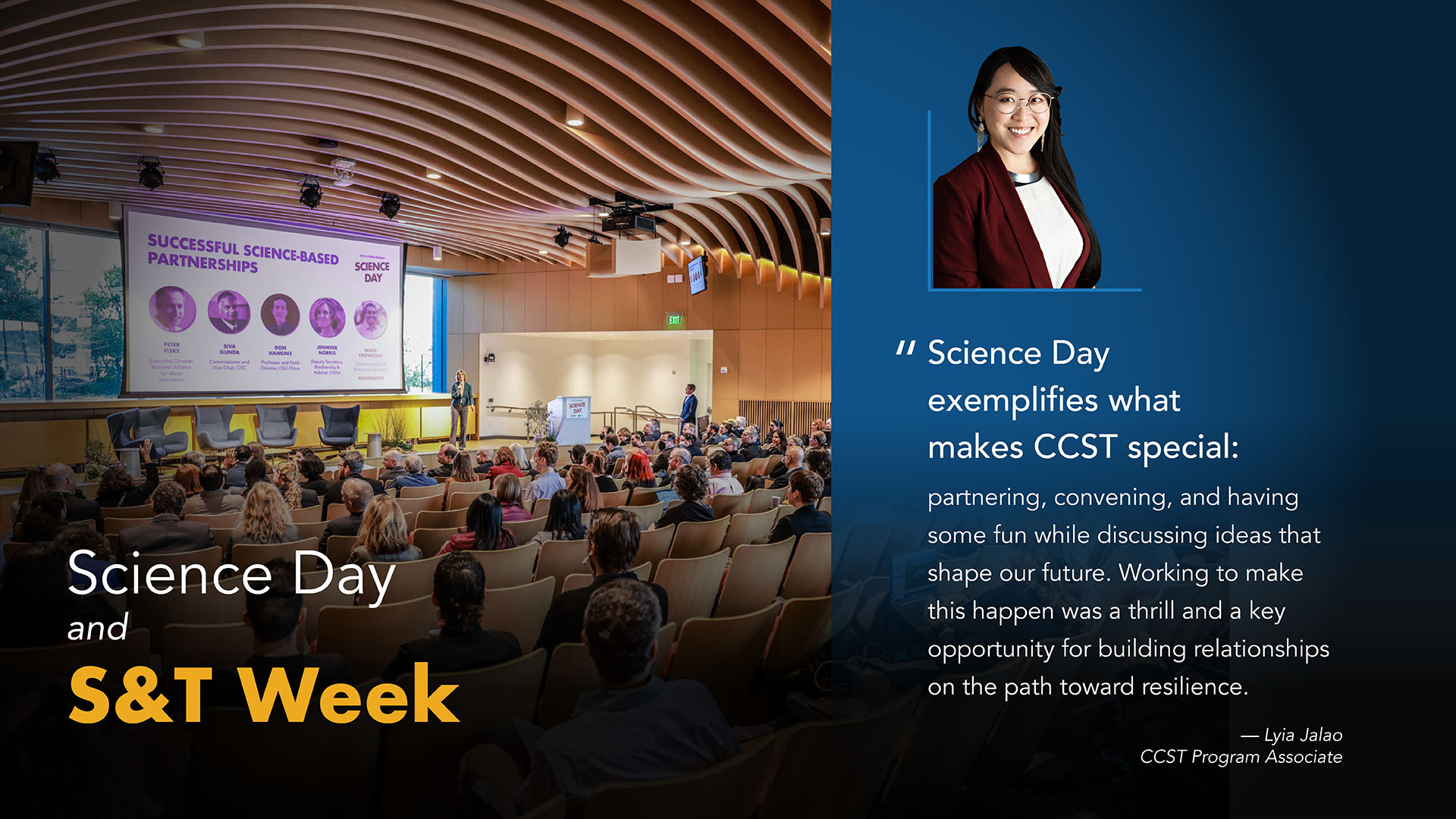
Inaugural “Science Day” at CNRA Kicks Off Science & Technology Week
CCST partnered with Natural Resources Secretary Wade Crowfoot to usher in Science Day, while celebrating S&T Week 2023.
Facing an ever-growing set of natural resource challenges, California has set ambitious goals to invest in climate resilience, protect its biodiversity, and ensure equitable access for all Californians to its natural resources. At Science Day, we invited researchers from California’s many world-class educational and research institutions to leverage their expertise to complement the State’s efforts.
Kicking off CCST’s Science & Technology Week 2023, Science Day featured two panel discussions with leaders, “Successful Science-Based Partnerships,” and “A Cross-Sectoral Call to Action: Meeting California’s Climate Goals While Building Resilience.” Both are available to watch online.
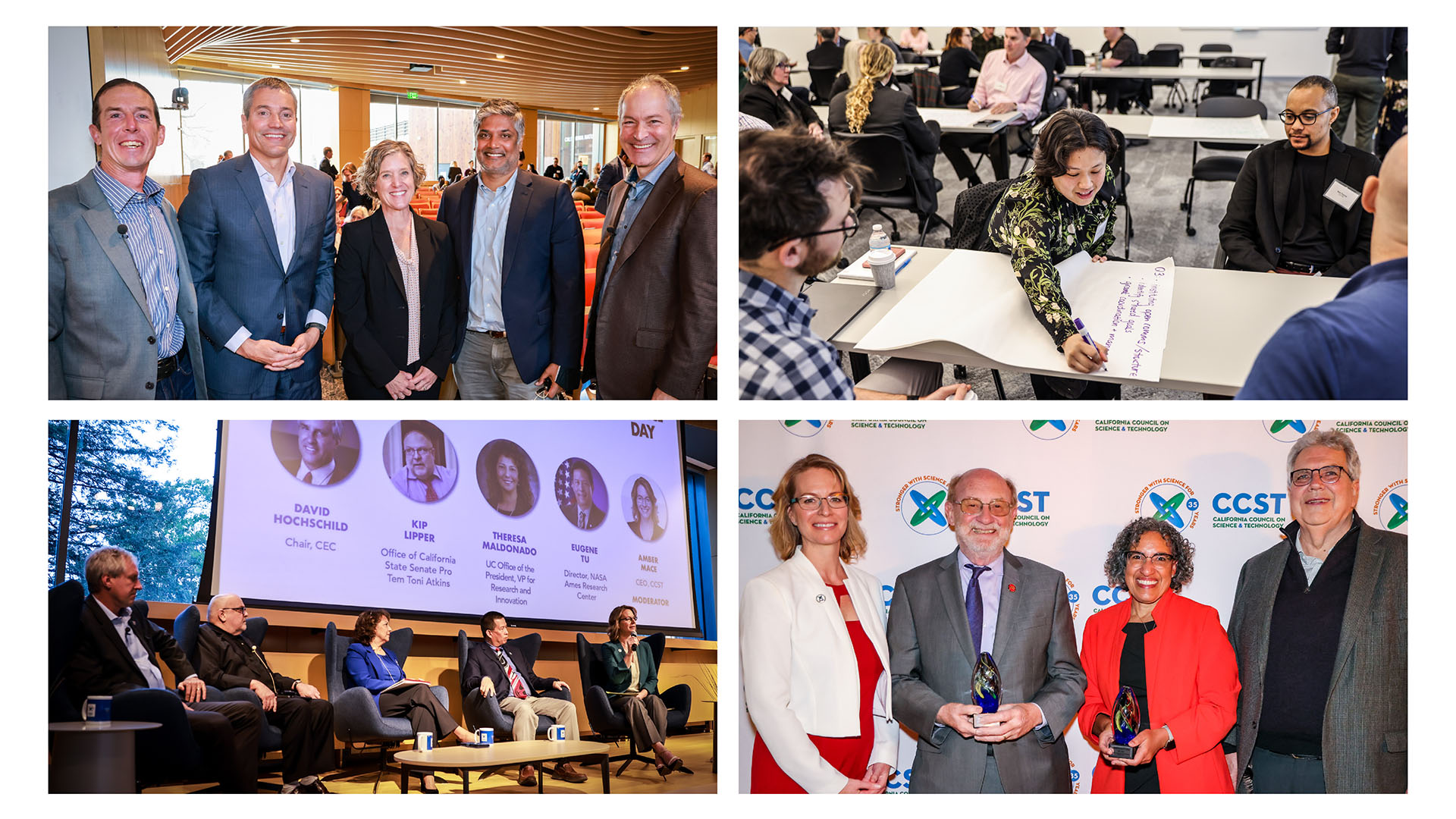
Following Science Day, CCST hosted it’s 35th Anniversary Reception and Leadership Awards Ceremony, where it recognized California Air Resources Board Chair Liane Randolph and California State Senator John Laird as recipients of the 2023 CCST Leadership Awards for Science in Public Service.
Throughout her career, Chair Randolph has demonstrated an ongoing commitment to promoting policies that advance science and technology in the state — especially in her roles as a California Public Utilities Commissioner, her time at the California Natural Resources Agency, and now as Chair of the California Air Resources Board.
Senator Laird’s deep commitment to promoting policies that advance science and technology in California is evident throughout his career, from his time as a California Assemblymember, to his work as Secretary of the California Natural Resources Agency, and now as a California Senator.
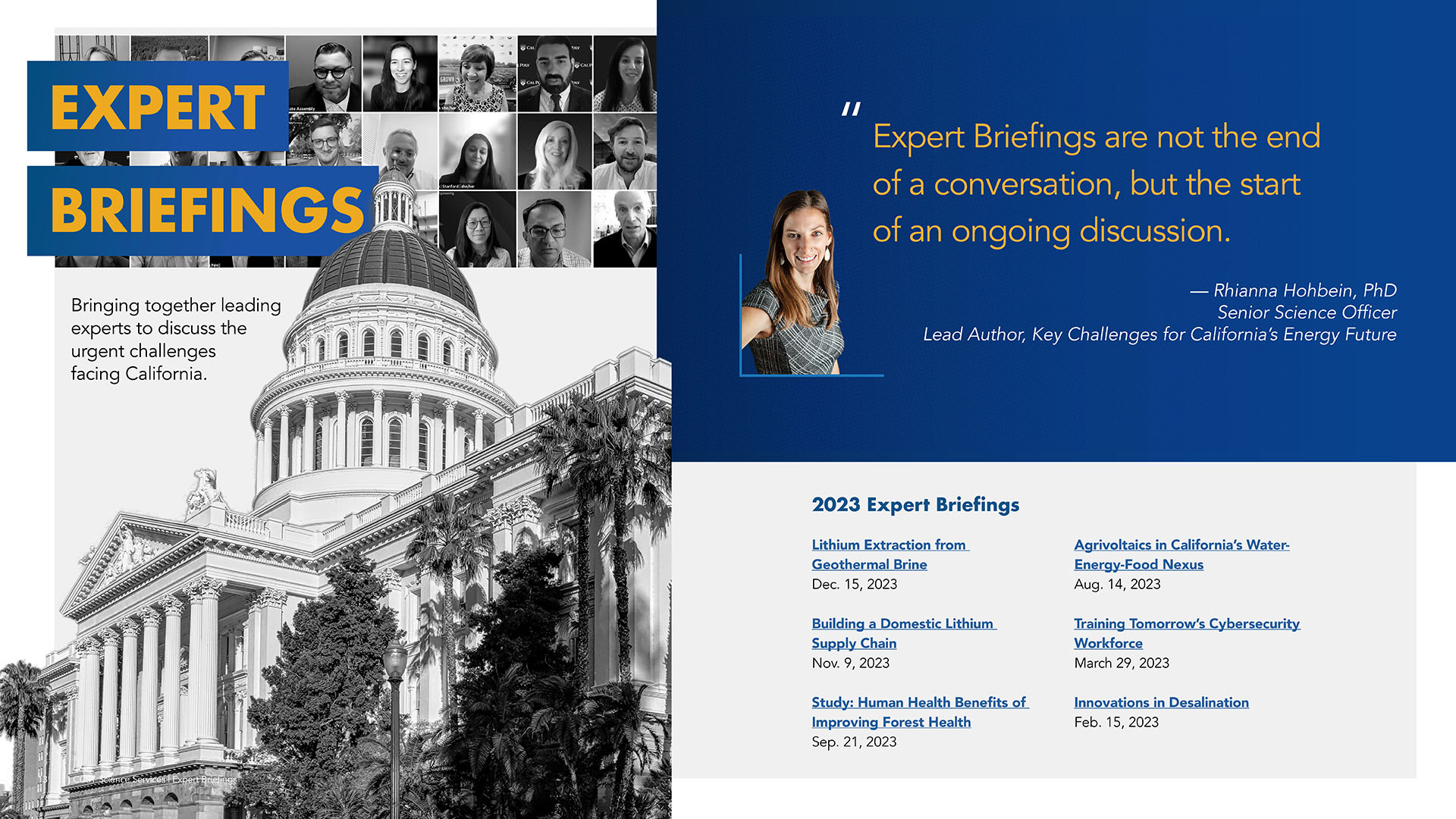
Experts Engage California’s Challenges to Find Solutions
CCST Expert Briefings Address Energy, Public Health, Cybersecurity, and More
CCST Expert Briefings, often held in partnership with State leaders of peer organizations, convene leading experts from CCST’s Partner Institutions and beyond to address pressing scientific and technical questions facing California policymakers. The one-hour briefings provide insights into long-term, equitable solutions for challenges ranging from climate change and extreme weather events to microgrids and salinity.
“They allow us to explore critical issues to California’s environment and economy, keeping pace with the latest challenges,” said Senior Science Officer Rhianna Hohbein, PhD. “They lead to exciting new connections and ideas. In my work on California’s energy future — and as we look toward the rapidly changing artificial intelligence environment — these briefings will be essential to sharing ideas and making progress.”
In 2023, CCST held a series of six briefings, focused on identifying and addressing the key issues on the California policy landscape critical to ensuring long-term disaster resilience.
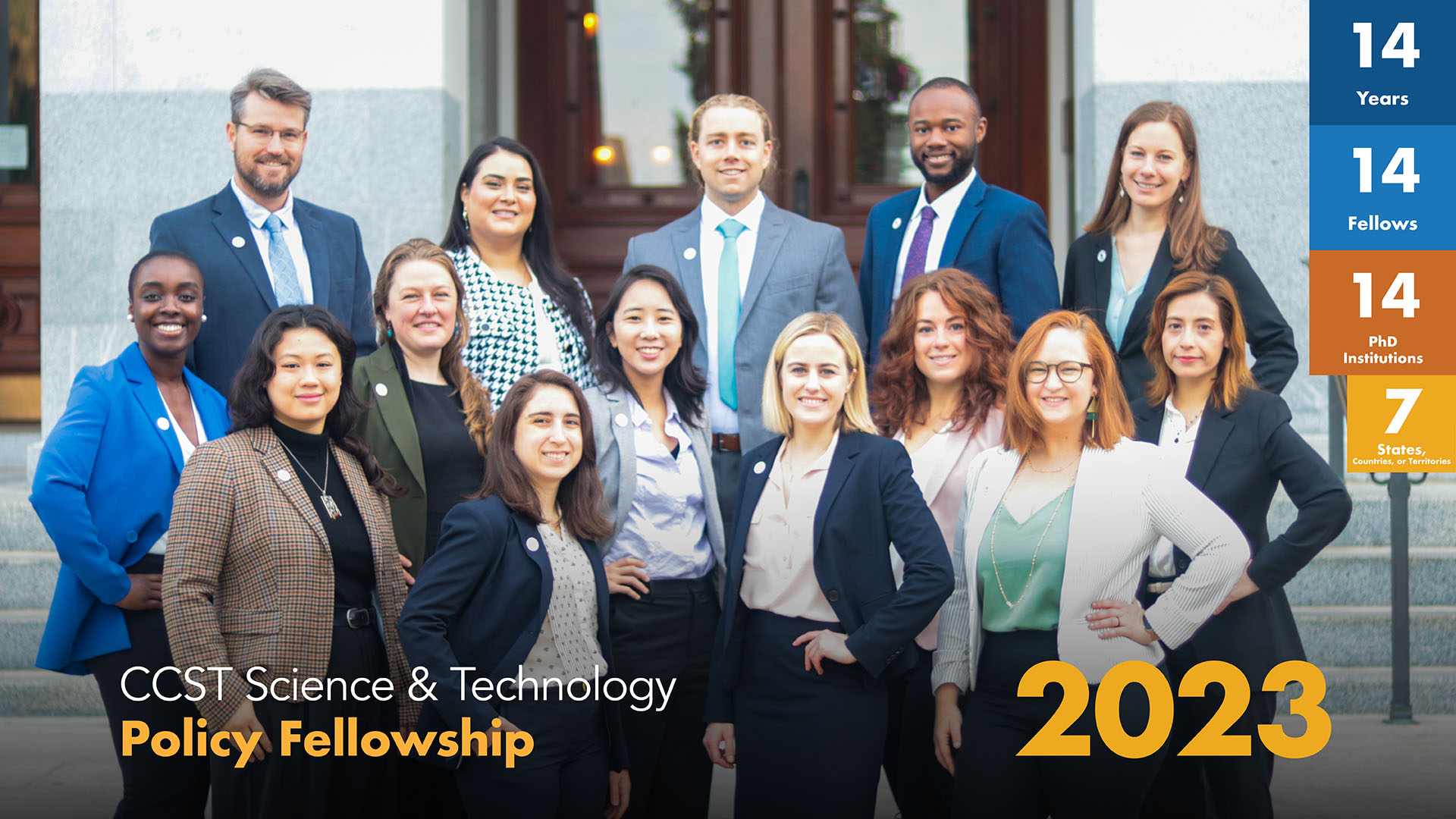
CCST Science & Technology Policy Fellowship:
Placing PhD Scientists into Policy Careers
The 2023 class of Fellows marked our 14th year of placing PhD-level scientists, engineers, and social scientists directly into legislative offices, policy committees, State Agencies, and Offices of the Governor. These 14 Fellows applied their diverse technical research backgrounds to their work with the State of California’s leading and priority-setting policy institutions.
Working in placements that included the California Governor’s Office of Planning and Research, California Natural Resources Agency, Assembly Utilities and Energy Committee, California Department of Insurance, Senate Environmental Quality Committee, California Air Resources Board, Assembly Transportation Committee, and more, CCST S&T Policy Fellows made an impact across a range of policy and regulatory fields.
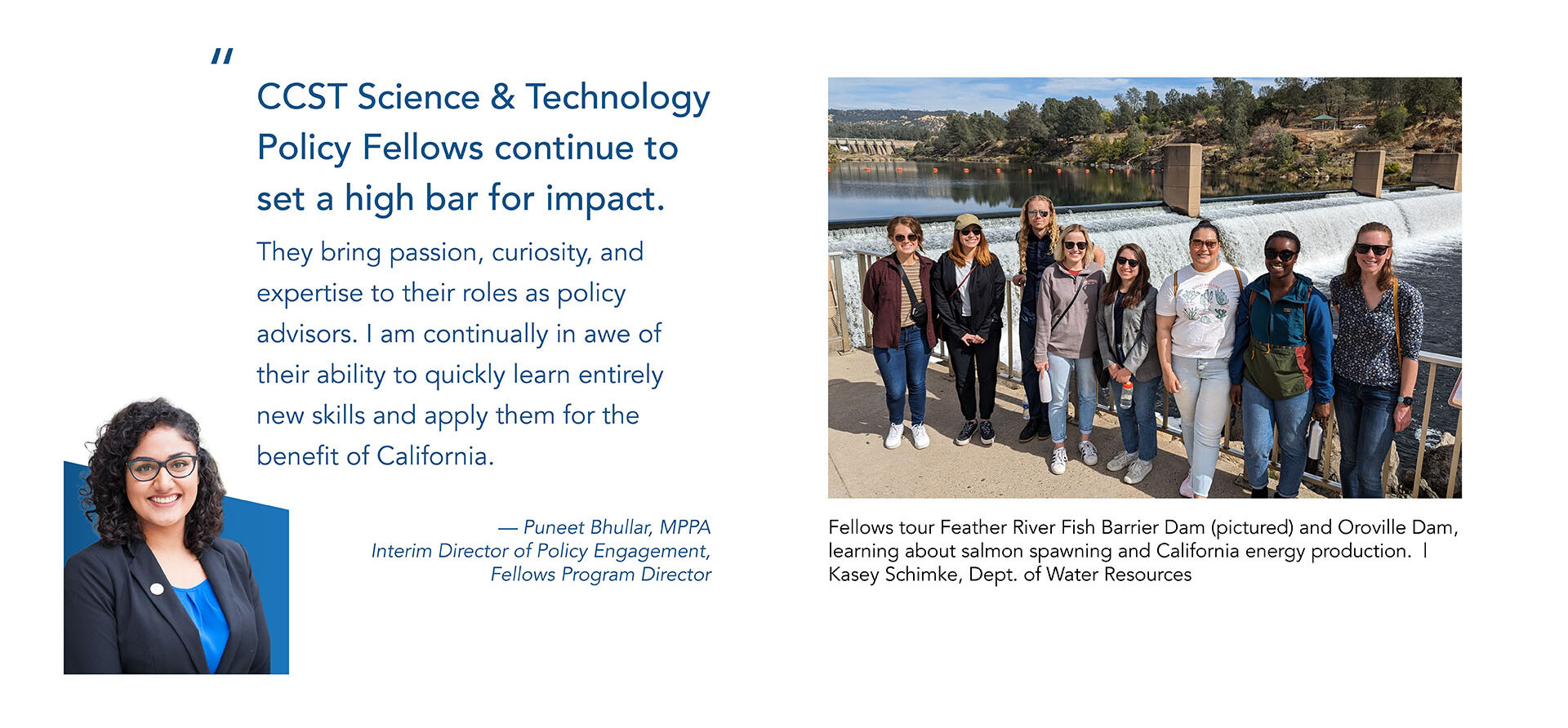
The 2023 class arrived for training at CCST’s Sacramento headquarters on November 1, 2022. During their training, the Fellows dove into California’s rich political history and learned how California’s policymaking process works, from idea to implementation.
Altogether, CCST S&T Policy Fellows have worked on over 1,400 bills, briefings, hearings, and bill analyses. There are now 158 alumni of the program, many of whom serve in positions in legislative offices and agencies. With the arrival of the 2024 class in November, 172 Fellows have now been trained to work directly with policymakers as trusted staff.
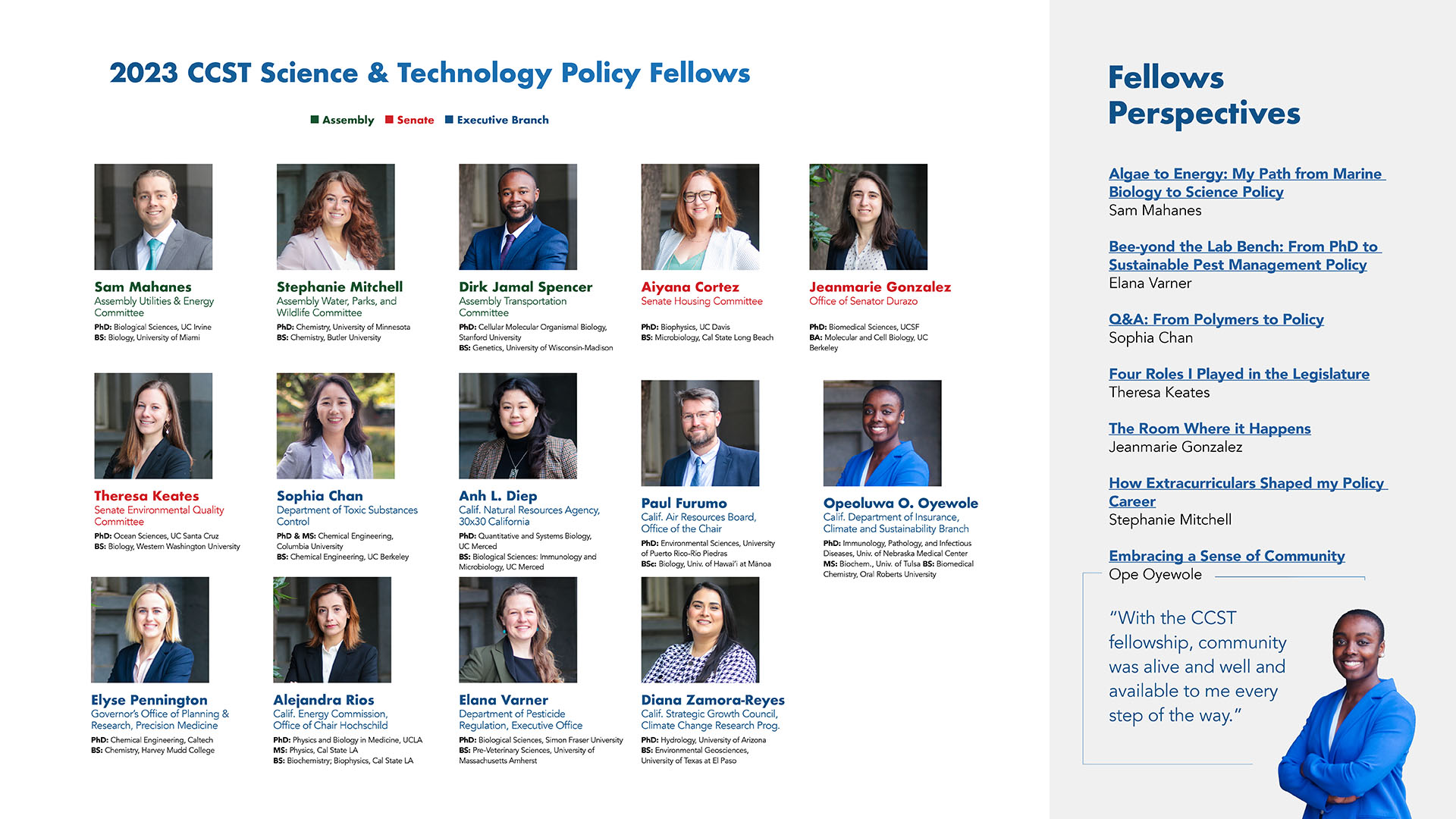
Learn more about the 2023 Fellows and read the Fellows blog.
Meet Our Board
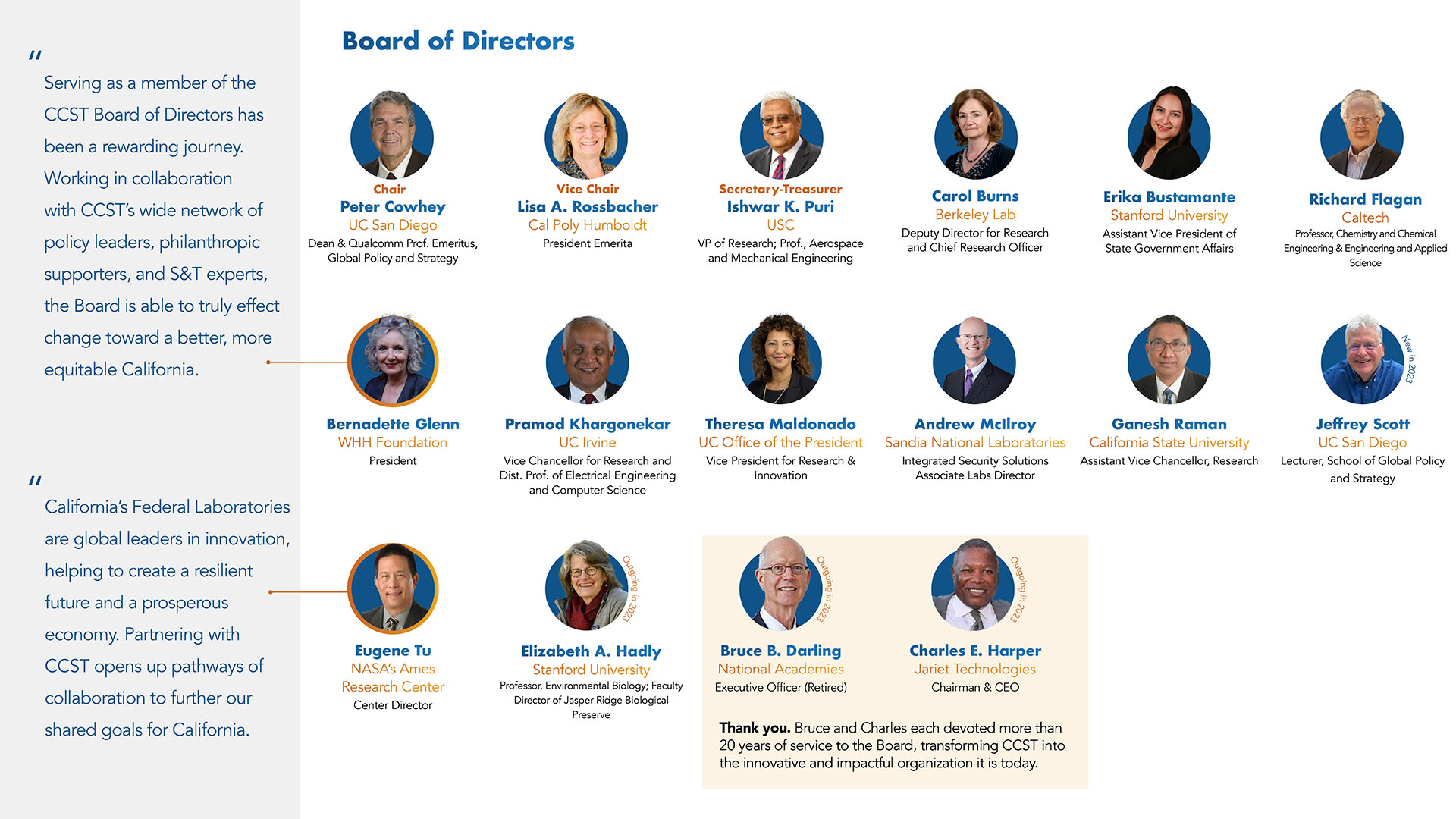
Learn more about our CCST Board of Directors.
Audited Financials (2023)
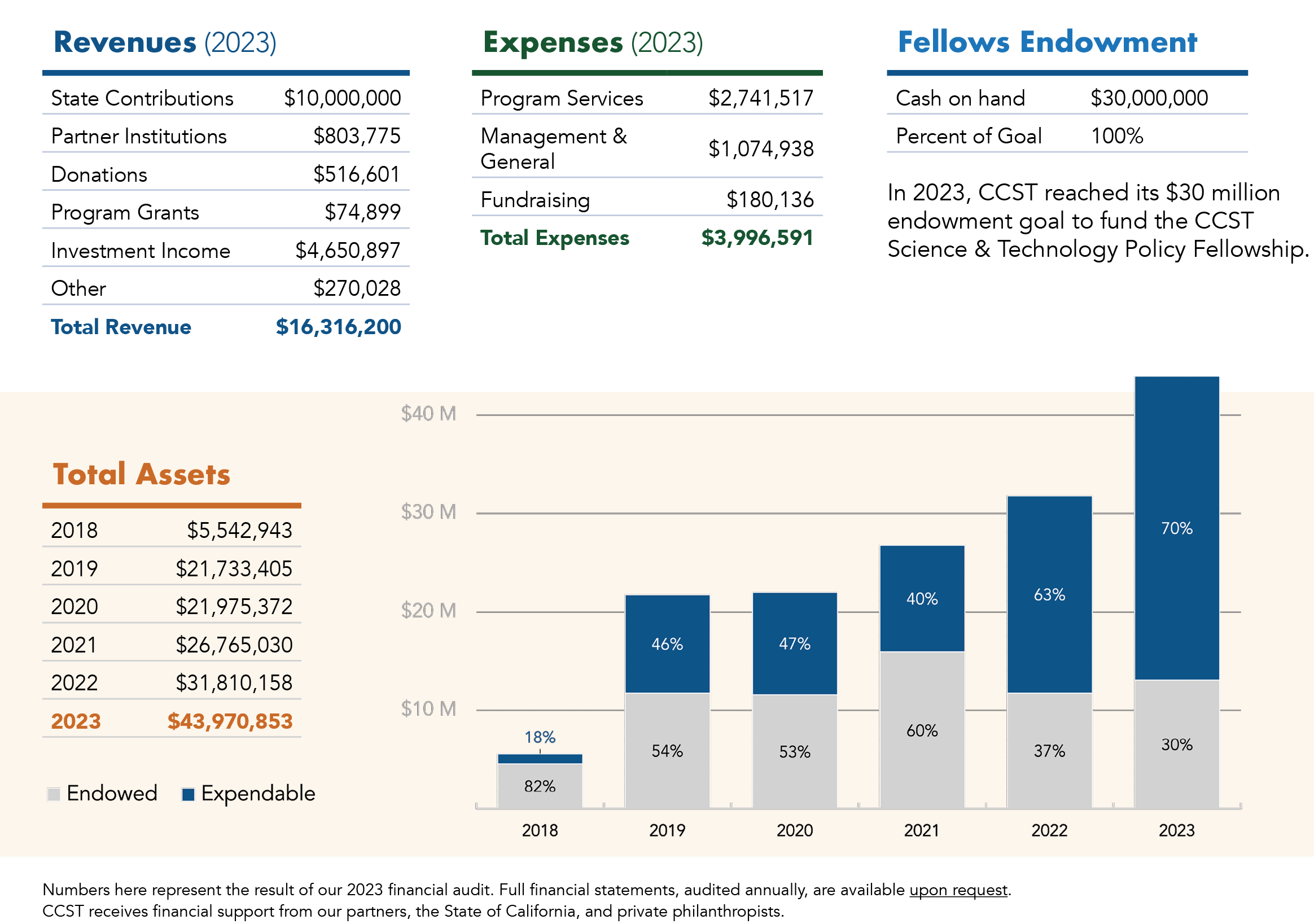
Thank you!
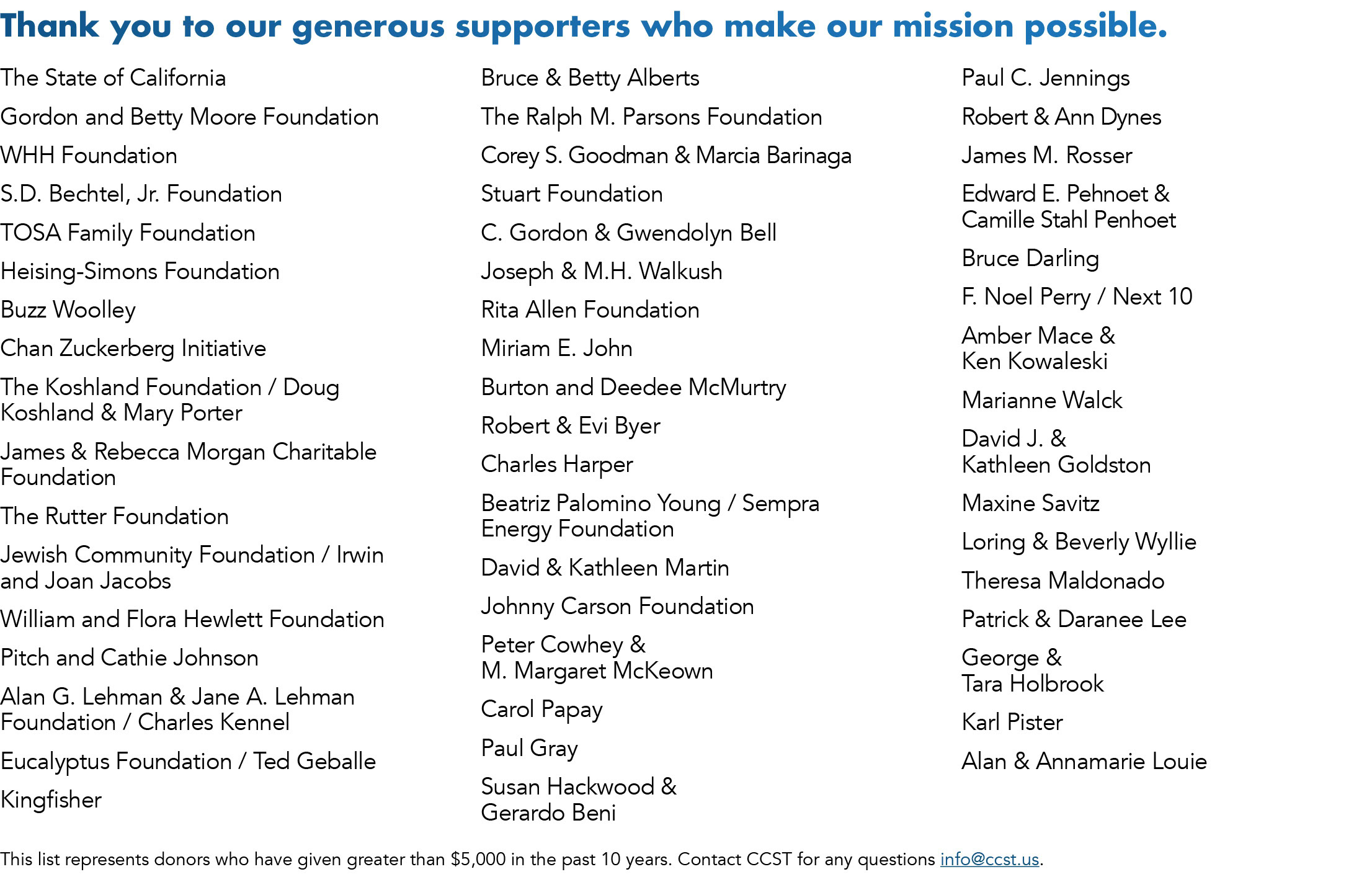
Read the full report:
Download a PDF of the full report to read all about our progress toward a disaster resilient California.
###
2023 Annual Report
Design & Production: Mikel Shybut, PhD; Authors (by last name): Keleigh Friedrich, Mikel Shybut, PhD; Financial Data: Lisa Poon, CPA; Photography: Capitol photos and S&T Week by Will Bucquoy; Fellows class photos by Gurleen Roberts. Cover: Palm Springs, Calif. Adobe Stock. Acknowledgments: Grateful for the work of 2008 Annual Report author Steve Olson for CCST history and quotes.
About the California Council on Science and Technology
The California Council on Science and Technology is a nonpartisan, nonprofit organization established via the California State Legislature — making California’s policies stronger with science since 1988. We engage leading experts in science and technology to advise State policymakers — ensuring that California policy is strengthened and informed by scientific knowledge, research, and innovation.

